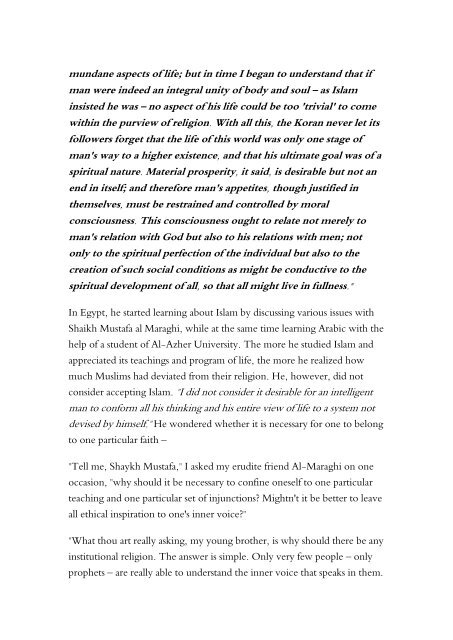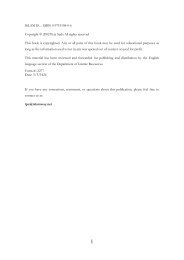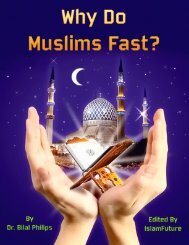The life Of Muhammad Asad , Leopold Weiss (1900-1992)
The life Of Muhammad Asad , Leopold Weiss (1900-1992)
The life Of Muhammad Asad , Leopold Weiss (1900-1992)
Create successful ePaper yourself
Turn your PDF publications into a flip-book with our unique Google optimized e-Paper software.
mundane aspects of <strong>life</strong>; but in time I began to understand that ifman were indeed an integral unity of body and soul – as Islaminsisted he was – no aspect of his <strong>life</strong> could be too 'trivial' to comewithin the purview of religion. With all this, the Koran never let itsfollowers forget that the <strong>life</strong> of this world was only one stage ofman's way to a higher existence, and that his ultimate goal was of aspiritual nature. Material prosperity, it said, is desirable but not anend in itself; and therefore man's appetites, though justified inthemselves, must be restrained and controlled by moralconsciousness. This consciousness ought to relate not merely toman's relation with God but also to his relations with men; notonly to the spiritual perfection of the individual but also to thecreation of such social conditions as might be conductive to thespiritual development of all, so that all might live in fullness."In Egypt, he started learning about Islam by discussing various issues withShaikh Mustafa al Maraghi, while at the same time learning Arabic with thehelp of a student of Al-Azher University. <strong>The</strong> more he studied Islam andappreciated its teachings and program of <strong>life</strong>, the more he realized howmuch Muslims had deviated from their religion. He, however, did notconsider accepting Islam. "I did not consider it desirable for an intelligentman to conform all his thinking and his entire view of <strong>life</strong> to a system notdevised by himself." He wondered whether it is necessary for one to belongto one particular faith –"Tell me, Shaykh Mustafa," I asked my erudite friend Al-Maraghi on oneoccasion, "why should it be necessary to confine oneself to one particularteaching and one particular set of injunctions? Mightn't it be better to leaveall ethical inspiration to one's inner voice?""What thou art really asking, my young brother, is why should there be anyinstitutional religion. <strong>The</strong> answer is simple. Only very few people – onlyprophets – are really able to understand the inner voice that speaks in them.




